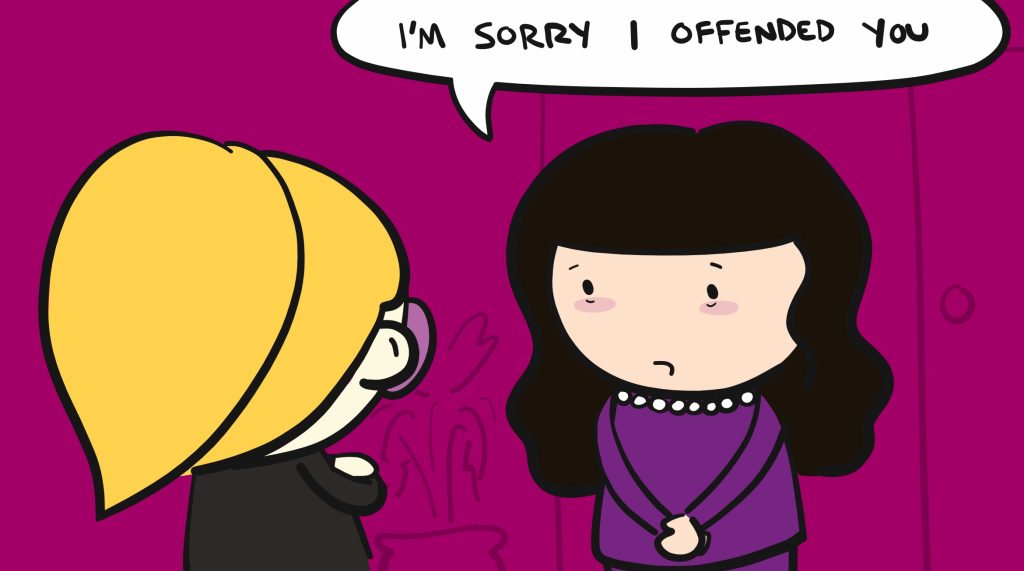So it happened. You said something insensitive and now your foot is lodged so deep in your mouth that you’re tasting toenail. Making an inappropriate comment at work can make you feel like you want to disappear and never see your coworkers again. Sometimes, you realize what you’re saying as it’s leaving your mouth and as you scramble to find a graceful way to save yourself, you watch your colleagues’ eyes widen while you socially crash and burn. Other times, the offensiveness of your statement doesn’t hit you until later, while you’re sitting at your desk or staring at your bedroom ceiling as you try to fall asleep that night. You might not even realize what you’ve said until a coworker points it out to you.
Offensive remarks come in many forms. Sometimes, they’re assumptions made about individuals and their experiences because of their personal backgrounds, race, gender, or position in the company. Everybody stereotypes others to a degree and sometimes, these stereotypes come out in the form of offensive language. Your personal experiences can also shape how you view the world and others within it, leading you to make jokes and remarks that you initially think are completely innocent, but can offend others.
For example, you might catch yourself asking an older colleague if he knows how to use certain technology or asking a coworker who’s pregnant for the second time if she knows how babies are made. Or you might have asked a colleague with a foreign-sounding name where he was born or a heavyset coworker if she’d ever considered dieting. All of these comments show the asker’s assumptions about the party being addressed, assumptions based on stereotypes and outdated cultural norms.
It can be very easy to say something inappropriate without meaning to offend anybody. If you make an offensive comment, you can’t go back in time and change what you said, but you can acknowledge it and apologize to the person you offended.
-
Address the comment head-on
Ignoring your mistake will not make it go away. Although your coworkers likely won’t mention it, they won’t forget that it happened. Your behavior is a reflection of your character, and the only way to change how your coworkers perceive your character is to change your behavior.
Don’t beat around the bush. Meet with the person you offended privately and acknowledge that you were wrong. Tell them you are sorry for the comment you made and that you regret offending them.
-
Don’t make excuses for your comment
If you feel the need to explain that you used an insensitive term or an inappropriate comment because of a simple misunderstanding or cultural differences, say so without using your innocence as a justification for your remark. In fact, keep the focus off yourself entirely during this conversation. You’re not the victim, so don’t make yourself out to be one through justification attempts or stories about times when you faced offensive remarks. You might feel like making jokes at your own expense or talking about other times you’ve embarrassed yourself by saying the wrong thing will help lighten the mood, but it will only shift the focus onto you and undermine your apology.
Your apology should show a genuine understanding of your error. It should not blame the victim for feeling upset, even if you feel he or she overreacted. Phrases like “I’m sorry you feel that way,” are not apologies, they’re excuses. In contrast, “I’m sorry I offended you,” and “I’m sorry I made you feel that way. I will change my behavior in the future,” are sincere expressions of remorse.
-
Be brave enough to correct your error
Brush up on current terminology to avoid using offensive language in the future. Terms can change rapidly, and you might not realize that a word that was acceptable a decade ago is offensive now. For example, many people now consider the term “wheelchair-bound” offensive. A more inclusive alternative to use is “wheelchair user” because wheelchairs don’t restrict people they help them be mobile and active. Small instances of consideration and actively choosing to eliminate inappropriate phrases from your vocabulary are the building blocks of strong, rewarding work relationships.
-
We all make mistakes. Let it go.
After you’ve apologized to the person you offended, let it go. Focus on building a positive relationship with that colleague as you move forward, rather than obsessing over whether he or she will ever like you again. You can’t make somebody like you, but you can make an effort to be a better coworker and friend.



